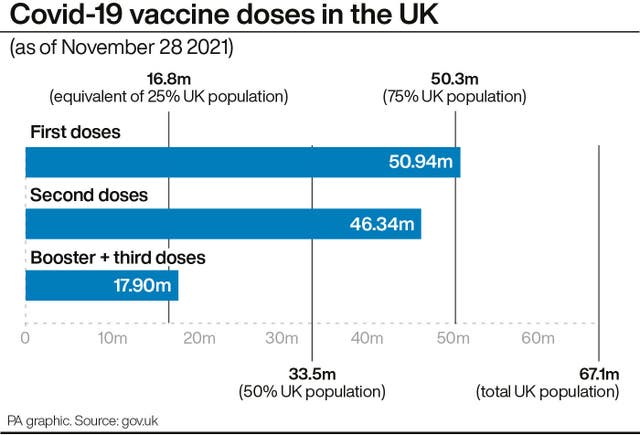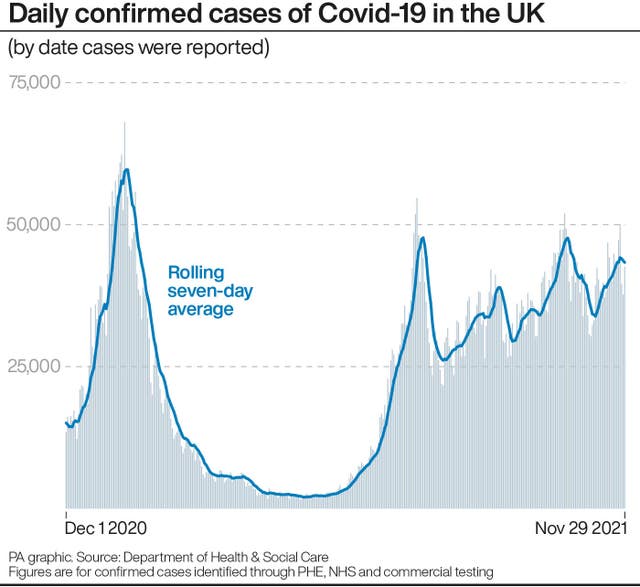All people aged 18 and over to be offered a Covid-19 booster vaccine
Booster doses should be given no sooner than three months after people have had their second dose of an original vaccine.

All people aged 18 and over are to be offered a Covid-19 booster vaccine as part of efforts to tackle the spread of the new Omicron variant.
Millions more people in the UK will become eligible for a third booster dose after early evidence suggested that higher antibody levels may protect better against the variant.
The Joint Committee on Vaccination and Immunisation (JCVI) is now advising that all adults aged 18 to 39 should be offered a booster dose, in order of descending age groups, to increase their level of protection. Those aged 40 and over are already eligible for a booster vaccine.
Booster doses should be given no sooner than three months after people have had their second dose of an original vaccine – shaving three months off the current six-month wait, according to the JCVI.
In further advice, young people aged 12 to 15 should be offered a second dose of the Pfizer/BioNTech Covid-19 vaccine, no sooner than 12 weeks after their first dose.
The JCVI also said that severely immunosuppressed people should be offered a booster dose no sooner than three months after completing their primary course of three doses.
Health Secretary Sajid Javid told the Commons he accepted the JCVI advice in full, adding: “With this new variant on the offensive these measures will protect more people more quickly and make us better protected as a nation.
“It represents a huge step up for our vaccination programme, almost doubling the number of people who will be able to get a booster dose to protect themselves and their loved ones.”
England’s deputy chief medical officer Professor Jonathan Van-Tam told a Downing Street briefing that coronavirus variants were inevitable and Omicron was the “new kid on the block for now” but suggested the UK was in “uncharted territory” as to whether it would take hold.
He added: “I think it’s true to say that scientists around the world, not just in the UK, unfortunately agree that this one is of increased concern.”
He said the “number of mutations present, already on first principle, makes us worry about a possible effect on vaccine effectiveness”.
Urging people not to panic, Prof Van-Tam said there were still uncertainties about how transmissible the variant is and its impact on severity of disease.
“On the effects of the new variants, and how well vaccine effectiveness will hold up, here I want to be clear that this is not all doom and gloom at this stage,” he said.
“I do not want people to panic at this stage. If vaccine effectiveness is reduced, as seems pretty likely to some extent, the biggest effects are likely to be in preventing infections and, hopefully, there will be smaller effects on preventing severe disease.”
Prof Van-Tam said the booster campaign has “never been more vital than at this point in time.”
He compared the situation to a football team with key players on a yellow card, saying that everyone needed to “up their game” in response.
“We started with 11 players in the team with the Wuhan vaccine. You could say that we picked up a couple of injuries when Alpha came along and then Delta came along, those variants that are slightly different from the Wuhan original strain.
“We’ve had to use our subs off the bench to keep us in the game, but we are well in the game – you can see that with the current epidemiology in relation to Delta, that the vaccines are holding up very well and largely keeping us out of trouble.
“Omicron is like now picking up a couple of yellow cards to key players on top.
“We may be OK but we’re kind of starting to feel at risk that we might go down to 10 players and if that happens – or it’s a risk that’s going to happen – then we need everyone on the pitch to up their game in the meantime.”
He added: “We’re not going to wait for the red card to happen, we are going to act decisively now and we’re asking everyone to up their game, we’re asking everyone to play their part in the urgency now of the booster programme, coming forward the moment you are called by the NHS.”
Professor Wei Shen Lim, chair of the JCVI told the briefing there was an increased likelihood of a “mismatch” between current vaccines and the variant, which may reduce the effectiveness of vaccines.

But he said a boost of either Moderna or Pfizer could really push up the immune response and cutting the time between doses could mitigate any drop in vaccine protection.
“If we can raise the level of immune response of the vaccine, that higher level of immune response will reach out and provide an extra level of protection to mismatched variants,” he said.
The expert said there was also a need to deploy booster vaccines “before the wave starts” with any new variant, which is why the new expansion of the vaccine programme is being brought in.
In its advice to ministers, the JCVI said that both the Moderna and Pfizer/BioNTech vaccines can be given as a booster for adults – with equal preference given to both.
An NHS spokesman said the new groups of people who are eligible for the booster vaccine will be invited to get a jab and the system is working “at extreme pace to respond to this new variant and to put in place the next and most complex phase” of the vaccination programme.
The NHS spokesman said: “The NHS will shortly set out how staff will expand the booster programme – this will include how booster jabs will be given in priority order so that the most vulnerable people are protected first, while also increasing capacity to vaccinate millions more people in a shorter space of time.
“The NHS will contact you when you are due to book in for your lifesaving booster vaccination, and when you get the call, it’s vital that people come forward as quickly as possible.”
In a speech to the King’s Fund annual conference on Monday, Amanda Pritchard, chief executive of the NHS in England, said NHS staff will “move heaven and earth to vaccinate as many people as possible” to ensure that people can enjoy Christmas with their loved ones.
But she said volunteers are needed to help the “vital national effort” of expanding the coronavirus vaccine programme, adding the service “will not be able to do it alone”.
On Monday afternoon, health ministers from the G7 group of nations held an urgent meeting to discuss the impact of Omicron.

A Department of Health and Social Care spokesperson said Mr Javid had “underlined the importance of Covid-19 surveillance and countries’ abilities to quickly share findings with the international community as well as the role of booster vaccination programmes to strengthen our defences”.
The UK now has 11 confirmed cases of the variant. The Scottish government announced on Monday morning it had discovered four cases in Lanarkshire and two in the Greater Glasgow and Clyde area.
One other case has been identified in Brentwood, Essex, with another in Nottingham, while a case was detected in England on Sunday in a person with travel links to southern Africa who visited Westminster before leaving the country.
Two more cases in England were announced on Monday in Croydon and Wandsworth in London.
From Tuesday, the wearing of face masks is set to be compulsory in shops and on public transport, while PCR tests will be brought back in for travellers returning to the UK.





